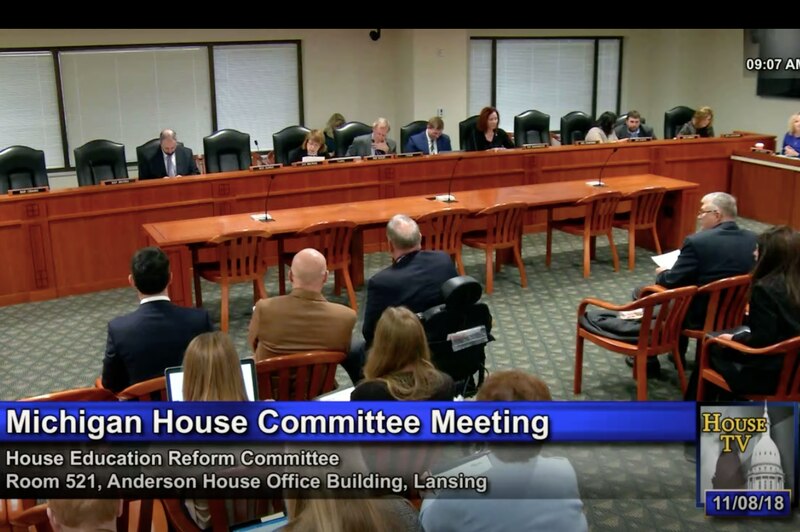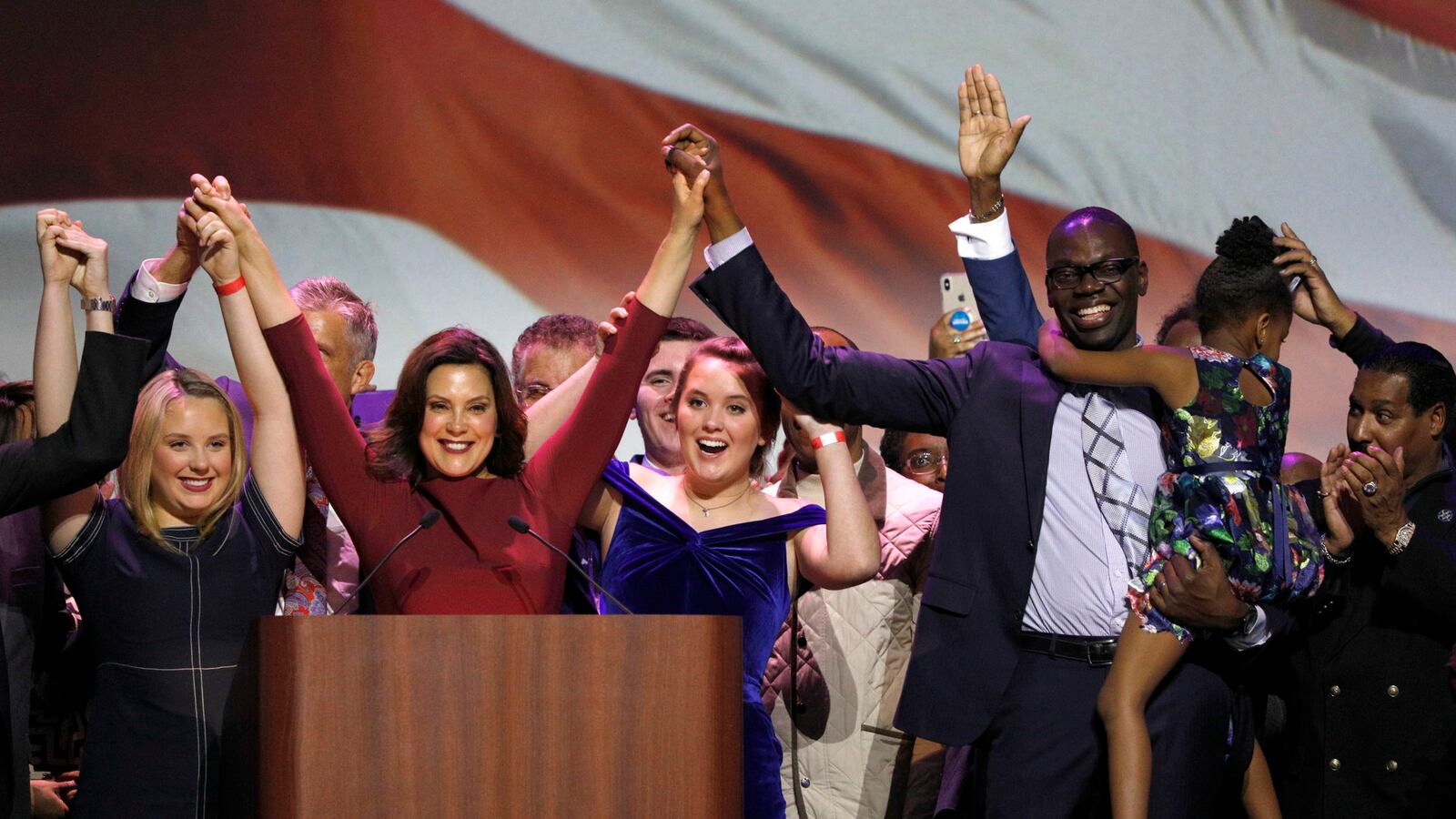With Republicans solidly in control of the Michigan legislature, governor-elect Gretchen Whitmer’s education agenda may depend on finding a sliver of common ground with the opposite party.
That common ground, experts say, could be a bipartisan proposal to spend a greater portion of the education budget on disadvantaged students.
A barrage of studies in recent years have blamed inadequate funding in part for the state’s backsliding academic performance.
A common thread — endorsed by charter school advocates and appointees of Republican Gov. Rick Snyder as well as much of the Democratic establishment — is the idea that it costs more to educate disadvantaged students.
“Low-income and special needs students do usually require more money,” said Tami Carlone, a Republican CPA from Northville who echoed her party’s fiscally conservative message on the way to narrowly losing out on a seat on the Michigan Board of Education.
That’s why observers think that school funding is one of a handful of education policies that stand a chance of succeeding during what is likely to be a contentious spell for Michigan’s state government.
Whitmer easily defeated her Republican opponent on Tuesday night, but observers say she’ll have a tough time convincing a GOP-controlled state legislature to walk back the tough third-grade reading law that goes into effect next year or expand free pre-K to every four-year-old in the state.
But both Democrats and Republicans have expressed interest in rethinking how Michigan allocates school funds, said Michelle Richard, vice president of Public Sector Consultants, a policy consulting firm in Lansing.
“There’s growing agreement that students have different needs, and those needs have different costs,” she said.
Michigan allocates most of its education dollars based on how many students schools enroll. But the amount that districts receive per student varies widely, with more money often going to richer schools.
When the current system — called Proposition A — was adopted in 1994, Gov. John Engler agreed to soften the blow for districts with large tax bases by paying them more for each student. Nearly three decades later, the wealthy suburban district in Grosse Pointe takes in a baseline “foundation allowance” of more than $10,000 per student, while only $7,900 per pupil goes to the neighboring Detroit Public Schools Community District.
In practice, Detroit receives additional funds designed to level the playing field. In recent years, it received more state funds in total than Grosse Pointe, even though its foundation allowance was lower. Three years ago, Grosse Pointe received $8,462 total per pupil from the state compared with Detroit’s $9,031 (the latest data is not yet available). Even so, the debate over school finance has focused on the gap in the foundation allowance, which makes up two-thirds of the state education budget.
“Most times when we talk about reforming the funding system, we’re talking about reforming the foundation grant,” said Craig Thiel, research director for the non-partisan Citizens Research Council of Michigan.
That’s because some experts think the allowance should be adjusted to ensure that districts like Detroit, which enroll large numbers of disadvantaged students, should get a bigger slice of the pie.
On the campaign trail, Whitmer stood behind a study published by the bipartisan School Finance Research Collaborative, which recommended that students from poor families receive 30 percent more state funds than their peers from higher-income families and that English learners receive as much as 70 percent more than the base amount.
On the campaign trail, Whitmer stood behind a study published by the bipartisan School Finance Research Collaborative, which recommended that students from poor families receive 30 percent more state funds than their peers from higher-income families and that English learners receive as much as 70 percent more than the base amount.
“I am dedicated to meeting that need,” Whitmer told Chalkbeat in an interview last month. “Now it’s going to take… building a coalition from business to parents to educators to make sure that we get it done. … I’ve got to have a legislature that will work with me so that we can deliver on that.”
She can bet that the concept will draw plenty of public support. A poll commissioned by the Collaborative found that 70 percent of Michiganders think the state’s schools are underfunded, while nearly two-thirds think its school funding system is unfair.
Traditional business interests, concerned that Michigan’s struggling schools are hurting the state’s workforce, are also mobilizing in support of education reform. If they supported a school funding proposal its odds of success would go up sharply.
A group of business leaders, teachers unions, and school administrators calling themselves Launch Michigan have begun discussing paths forward for education reform under the next administration. Its steering committee includes the Grand Rapids Area Chamber of Commerce, the Small Business Association of Michigan, charter school advocates, and a member of the School Finance Research Collaborative.
The group’s website says “we will work together to ensure that the resources are available to provide for an equitable student-centered education system and funding model.”
Jen Nelson, a vice president for public policy and economic development at Business Leaders for Michigan, whose president chairs Launch Michigan, says the group has a sense of urgency around education issues in Michigan. She added that school funding reform is just one of several policies the group may endorse.
“We’re coming together because we know there’s a need to make a change,” Nelson said. “Whatever we come up with as part of Launch Michigan should be able to work regardless of who is in charge in Michigan.”
Even if the group decides to support a reworking of Michigan’s funding formula, the effort would likely face serious obstacles. For starters, the Collaborative’s recommendations include raising baseline funding to more than $9,500 per student, an expensive proposition that will likely fall flat with Republicans who for eight years have focused on balancing the state budget. What’s more, Republicans increased the per student rate this year, trumpeting the latest education budget, which does not come close to meeting the recommendations of the Collaborative, as the “largest single year budget increase in 15 years.”
“More money does not mean better results,” said Beth DeShone, director of the Great Lakes Education Project, a charter school advocacy group founded by the family of U.S. Education Secretary Betsy Devos that spent over $225,000 this election cycle to help elect Republicans to Michigan’s state legislature.
Michigan may soon have some wiggle room, however, thanks to the legalization of marijuana in the state and a Supreme Court decision that will allow the state to impose a tax on more online sales. Under the marijuana ballot proposal approved on Tuesday, some of the tax proceeds from pot sales are earmarked for schools.

Without a funding increase, any attempt to change the way school money is distributed could run into the same political minefield that Engler faced in 1994. If funding levels stay the same, a transfer of state funds to disadvantaged students would effectively shift funding from wealthy, mostly suburban districts to struggling schools in Detroit, Battle Creek, Grand Rapids and Flint, which enroll far more students from poor families.
“When some low-need, high-income districts get less than some high-need, low-income districts, that’s a politically difficult conversation, regardless of who has power in Lansing,” Richard said.
School funding isn’t the only piece of common ground between Michigan’s legislature and its new governor. Expanding early childhood education has won support from both parties in the past, and Whitmer has said it is a priority.
But education policymakers have zeroed in on school funding, making it a top candidate for any potential show of bipartisanship.
“Everyone’s agreed that the way we fund schools in Michigan needs to change, somehow,” said Judy Pritchett, a former chief academic officer for the Macomb County Intermediate District and a newly elected Democratic member of the state school board.
“The devil is always in the details.”
CLARIFICATION: Nov. 12, 2018: The original version of this story — headlined “A rich Michigan district get $10.1K per student. Its poorer neighbor gets $7.9K. Will Michigan’s divided government change the math?” — referred only to the state’s “foundation allowance,” a baseline amount of funding sent to each district which has become the focus of a push for school funding reform. The article has been updated to reflect the fact that districts like Detroit currently receive additional funding for special education and for disadvantaged students.

